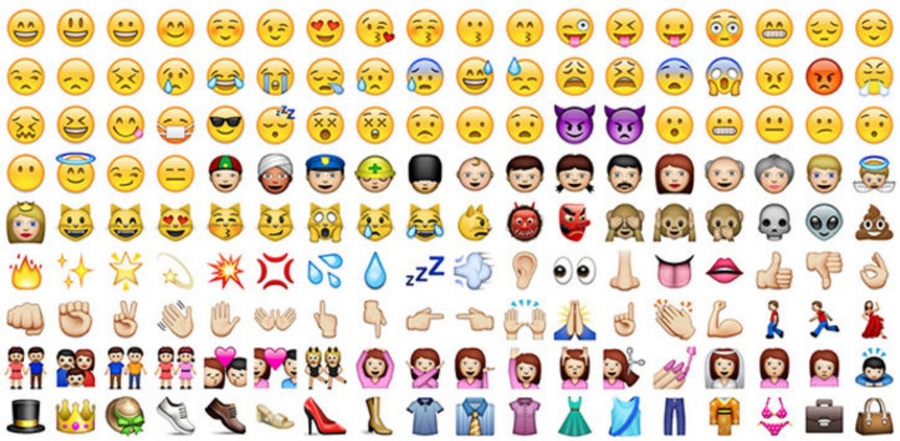
image: Glamour
The Oxford Dictionaries’ word of the year for 2015 was not actually a word at all; it was an emoji. The laughing so hard you’re crying emoji to be exact (see above: second row, fifth from the left). It seemed an appropriate move, considering that according to one study, at least 74 percent of Americans use emojis, emoticons, and similar images on a regular basis.
Given their popularity and the fact that big tech companies, like Apple (which was sued last week by Emonster, the Japanese company that holds the U.S. trademark rights in the word “Animoji”), Facebook, Google, Twitter, Microsoft, etc., each use their own distinct set of emojis, it comes as no surprise that the protectability of these little icons is increasingly being called into question.
The answers have been less than straightforward, of course. There are some lawyers that have held that, “Emojis, like other types of visual art, can be protected by copyright.” Others are less convinced, namely because according to the Copyright Office and the federal courts to have examined the issue, typefaces are not copyrightable.
Still yet, there are only a few cases addressing the copyrightability of typefaces, and there have not been any – yet – that focus specifically on the issue of copyright protection for emojis, making this something of a must-watch area of law in the years to come. And while this might appear to be a trivial inquiry, at best, they’re just emojis, after all, it is actually proving a substantial issue not only on the copyright front.
More Than Just a Copyright Question
No, courts are increasingly being forced to grapple with how emojis should be handled (think: When a text – such as a text message, email, or social media post – containing an emoji is presented as evidence, is the emoji significant and unambiguous enough to be presented to the jury? Are some emojis significant, but others, not? And if they are important, how is a court to share such information with a jury? By sight? By sound?). Courts have also been forced to tackle what individual emojis actually mean in any given context.
In 2015, alone, these little online signifiers figured into at least nine cases. As noted by The Marshall Project, a nonprofit online journalism organization focusing on issues related to criminal justice, “In none of [those] cases did the result hinge on how emojis were interpreted.. However, “the courtroom exchanges indicate that at some point in the near future, the court system will have to determine whether these symbols express such specific and unambiguous meaning that, like words, they can be introduced into evidence.”
And that time is already upon us.
In the past two years, courts have been forced to identify a wide range of issues, in which emojis were highly significant. For instance, as noted by Morrison & Foerster LLP’s John F. Delaney, “In an opinion last year dismissing a male law school student’s suit against local police and a female classmate for having the male student formally investigated based, at least in part, on text messages that he had sent, a federal district court in Michigan held that the male student’s text messages showed that he may have had an intent to harass the female classmate despite ‘the inclusion of the emoticon, ‘-D,’ which appears to be a wide open-mouth smile.’”
“The court held that the emoticon ‘does not materially alter the meaning of the text message,’ in which the male student otherwise wrote that he wanted to do ‘just enough to make [the female student] feel crappy.’”
Emojis are also proving central in employment-related matters. In June 2016, a German labor court ruled that referring to superiors with emoticons of animal heads – such as in this case a pig’s or monkey’s head – in a conversation among employees on Facebook may be an insult, but was not sufficient reason to justify the termination of an employment contract.
Still yet, emojis are popping up in sexual harassment matters, as well. The Delaware Chancery Court held last summer that a “smiley-face emoticon at the end of [the defendant’s] text message suggests he was amused by yet another opportunity to harass the plaintiff.” That case was initiated by the female co-CEO of a Delaware corporation against her male co-CEO counterpart.
At least one emerging trend in many of the cases dealing with the question of how to treat emojis comes in the context of online threats, which are more often that not laced with emojis.
Going Forward 😉
As noted by WIRED’s Julia Greenberg in her January 2015 article, entitled, That 😉 “You Type Can And Will Be Used Against You In A Court Of Law,” “When the digital symbol for a gun, a smile, or a face with stuck-out tongue comes up in court, they aren’t being derided or ignored. Emoji matter.”
As such it appears that emojis will go to way of fingerprinting, DNA and cell phone records. What technology spawns sooner or later makes its way into court, often as evidence.










